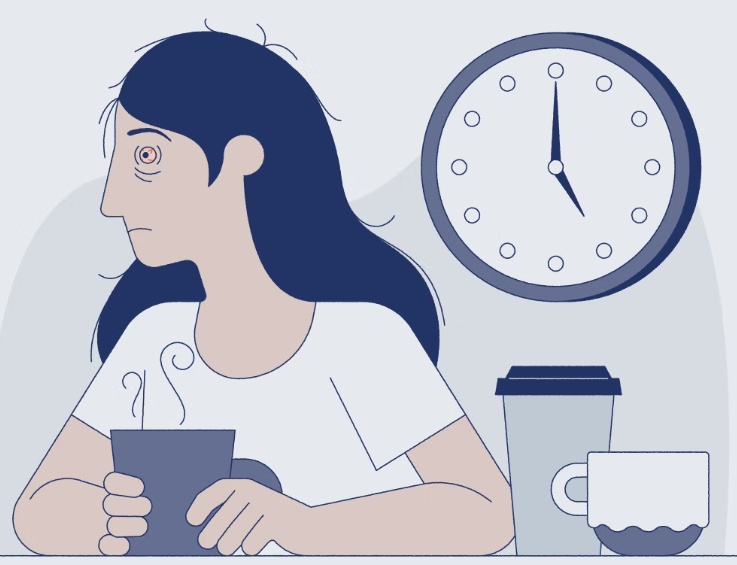The Effects of Sleep Deprivation
November 9, 2022
Isn’t it an awesome feeling when you plop into bed, fall fast asleep, sleep through the entire night, and wake up feeling bright, happy, and ready to tackle the day?-I wish!
Not getting enough sleep is known as sleep deprivation, and it dramatically impacts the lives of most of the teenage population.
Did you know a National Sleep Foundation poll found that the majority of high school students in the United States get less sleep than the recommended eight to ten hours each night? How many hours of sleep do you get every night? I was surprised to learn that sleep deprivation leads to many negative consequences, including poor grades, anxiety, depression, severe lateness and even suicidal thoughts, not to mention that it doesn’t improve my mood! Does your lack of sleep impact you in any of these ways?
Sleep expert Mary Carskadon, at Bradley Hospital, believes teenagers actually need more sleep than younger kids. Nine to ten hours of consistent sleep is what she thinks teenagers need to be alert throughout the day. You may be asking yourself why don’t teenagers just go to bed earlier? Well it’s not that simple. I would like to go to bed earlier but when I do, I just can’t fall asleep! Some researchers suggest that the hormonal shift in our bodies is what causes teens to fall asleep later than their parents or younger siblings, causing them to want to sleep later in the morning. The hormonal time shift is when hormones cause the teenager’s body clock to move forward by about one or two hours, making them sleepier one or two hours later. Who knew! So, as teenagers we fall asleep later but we are forced to wake up to early school start times. This prevents us from getting those much needed recommended hours of sleep every night.
There are also many social and community responsibilities from school, friends, and after school activities that keep teens awake. The pressure on teens to perform can be really intense and only increases throughout high school. Teens are overwhelmed by homework, tests, college applications, volunteering, and many other expectations that they are required to meet. There is also physical and emotional pressure from outside activities such as sports, part-time jobs, and even home-life.
In order for me to be on time for an 8:20 am start to the school day, I have to be awake by 7:30 a.m. which means I need to be asleep by 10:00 p.m. When teenagers enter high school they are forced to wake up at a relatively early hour which constricts their time for sleep. Teenagers are forced out of bed usually before they are mentally and physically ready. This takes away precious hours of sleep that allows the brain and body to slow down and take part in a process of recovery, which improves physical and mental performance the next day and over the long-term. Bottom line…teens need more sleep!
We live in a culture that values activity over sleep. This is a terrible mistake. Sleep has many benefits and is believed to help regulate emotions and lacking sleep is an underlying component of many mood disorders, such as anxiety and depression. Many teenagers describe the feeling of having difficulty recalling specific details from events and feel that lack of sleep is responsible and leaves them emotionally useless. Absence of sleep leaves teens unable to deal with stress because they are incapable of coherent thoughts. When life is especially busy, you push yourself so hard and a consistent lack of sleep causes you to eventually just lose it. A conversation with most teens would find they reached their breaking point when they are really tired. Rebecca Bernert, PhD, who directs the Suicide Prevention Research Lab at Stanford, said sleep may affect the way teens process their emotions. Sleep disturbances may result in difficulty sorting out emotional issues which might make teens more prone to suicidal thoughts and behaviors. The health risks are far too great to not be making sleep a priority!
Be aware of the tell-tale signs of sleep deprivation. Pay attention if you feel a strong desire to sleep, if you are too tired to respond in class or in conversation with friends, if you have no energy, if you are becoming careless, irritable, have a short attention span, are experiencing angry outbursts, or even if you feel like you’re completely shutting down!
Unfortunately, there is no changing school start times! But you can change your daily night routine to help you get the necessary amount of sleep. To prevent myself from becoming sleep deprived during this school year, I will be taking these steps and applying them to my daily life. First, being more active during the day can help improve your mood, ease stress, and leave you more tired for when it is time to go to sleep. Second, avoid caffeine near bedtime and limit the amount of caffeine you consume throughout the entire day. Third, a major issue stopping teenagers from consistently getting a good night’s sleep is no surprise: your phone! The light from your phone or any electronic device tricks the brain into thinking it’s daytime which prevents your body from entering deep sleep, so turn off your phone and turn out the lights! Last, going to bed at a consistent time every night helps the body to expect sleep which enhances the relaxation effect allowing the body to fall asleep faster. Before going to bed unwind every night by reading, meditating, listening to music, or doing anything else that relaxes you.
